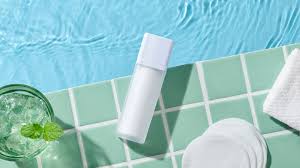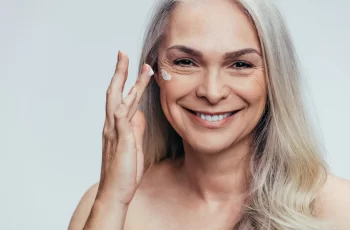
How to Tweak Your Skin-Care Routine for Summer, Depending on Your Skin Type
Some products should remain constant throughout the year, but summer may present specific challenges for your complexion — like hyperpigmentation and acne — that you’ll want to prepare for.
Summer, with all the heat, humidity, and sunshine it brings, can be both a boon and a bane to your skin. You’re likely spending more time outside, which exposes your skin to damaging and aging UV rays. But the air tends to have more moisture, giving normally dry skin some much-needed hydration after a cool and drier spring.
You may not need to completely overhaul the skin-care regimen that worked for you in the spring, but if you’re looking to maximize your summer glow and prevent some common skin concerns, there are a few considerations to get your routine up to speed, whatever your skin type.
As a quick overview, you should keep (or start) your retinol and antioxidant routine, treat and prevent acne and pigmentation issues, recommit to sun protection, and consider whether you need to adjust your cleanser and moisturizer, says Deirdre Hooper, MD, a board-certified dermatologist at Audubon Dermatology in New Orleans.
Just remember that, depending on your skin type and how it reacts to the environment, you may not have to make radical changes at all — and it’s okay if you don’t, says Dr. Hooper. What’s more important is paying attention to your skin’s particular response to the summer weather and adjusting your routine as needed.
If Your Body Is Acne-Prone, Opt for an Antibacterial Wash
Nobody enjoys the sticky sensation of summer sweatiness, least of all when it’s followed by an acne outbreak. It’s not sweat itself that’s the problem, but rather the bacterial growth it encourages: Sweaty skin provides a warm, moisture-rich environment that allows the natural bacteria on your face to proliferate and cause pimples, says Hooper. These breakouts can happen on both your face and body.
If acne is popping up on your back, butt, or the fronts of your thighs, use an antibacterial wash to neutralize bacteria. Look out for a wash containing benzoyl peroxide, an antibacterial agent recommended by the AAD for the treatment of acne. Another acne-fighting ingredient that you may be less familiar with is hypochlorous acid, which is a diluted form of bleach, Hooper notes. This mild acid has antibacterial, antifungal, and possibly even antiviral properties, and may have therapeutic benefits for acne, scalp eczema, and keloid scars, according to a review published in the Journal of Clinical and Aesthetic Dermatology in November 2018.
“My new favorite body wash for people who get full-body ‘bumpies’ is CLn BodyWash [CLnwash.com],” adds Hooper. “I recommend using it for four weeks and [then] see how your skin responds.”
If Your Skin Is Oily, Switch to a Salicylic Acid Cleanser
Now that it’s warmer, you may be noticing that little blackheads dot your nose, chin, and forehead. For some people, says Hooper, “in response to heat, their body starts to overproduce sebum [oil],” leading to clogged pores that show up as tiny black dots on the skin.
She recommends an exfoliating facial wash to keep pores clear, and particularly likes SkinCeuticals LHA Cleansing Gel (SkinCeuticals.com), which combines two exfoliators: glycolic and salicylic acid. Glycolic acid is a water-soluble alpha hydroxy acid (AHA), which helps to exfoliate dead skin cells from the surface of the skin; salicylic acid, meanwhile, is an oil-soluble beta hydroxy acid (BHA) that helps reduce oil and banish blemishes deep within the pores. Look for a cleanser with glycerin to maintain appropriate moisture — per CosmeticsInfo.org, it’s a humectant, meaning it prevents the loss of moisture from the skin.
Breakout-prone skin may also benefit from the switch from a creamier cleanser to one that’s gel-based or foaming, in order to better control oil.
If Your Skin Is Dry, Consider a Lighter Moisturizer
The good news is that the higher humidity in the air should help provide more moisture to skin, explains Angela Lamb, MD, an associate professor of dermatology at Mount Sinai in New York City. Even if your skin is a bit dewier this time of year, you’ll still want to moisturize.
If you find that your normal moisturizer is too heavy this time of year, consider one that’s lighter, such as those that contain hyaluronic acid. You can also assess the heaviness of a moisturizer by the way it looks, says Dr. Lamb. Clear or gel moisturizers are more water-based than creamy or white moisturizers, which have more emollients to trap moisture. One good option? Neutrogena Hydro Boost Gel-Cream, which is formulated for extra dry skin (Ulta.com).
If Your Skin Is Combination, Use a Toner
It can be frustrating to have a combination skin type, which means that your face has areas of dry and oily skin. Dryness is often found on your cheeks, while oiliness tends to settle in your T-zone, which is the area of your forehead, nose, and chin. You can feel free to treat these differently, says Lamb. “Avoid applying skincare to your entire face and use targeted treatment,” she says. Though she typically doesn’t recommend toner, this is perhaps one time where it can be useful. Apply a toner to your T-zone, skipping any areas that are commonly dry. There are several toners you can consider, including those that control oil or cleanse pores, provide light hydration with ingredients like hyaluronic acid, or are mattifying.
No Matter Your Skin Type, Apply Sunscreen Daily and Reassess Your Cleanser and Moisturizer
All skin types benefit from a generous application of sunscreen. Plus, whether you’re oily, dry, or combination, you’ll want to look at both your cleanser and moisturizer to ensure they’re the best choices for your skin this season.
Find Your Hero Broad-Spectrum Sunscreen
Broad-spectrum sunscreen is a must, as it blocks both UVA and UVB rays that cause skin cancer and contribute to aging, according to the AAD. Whether it’s sunny or cloudy outside, use a broad-spectrum SPF 30 and purchase a product with zinc oxide, suggests Kenneth Mark, MD, a cosmetic dermatologist in New York City. “The single best protective ingredient against the sun is zinc oxide, which is also very soothing to the skin,” he says.
Research also indicates that zinc-oxide-based sunscreens, which form a protective barrier to reflect UV rays and have minimal skin penetration (they’re a main ingredient in mineral or “physical” sunscreens), are safe for daily use. One option is Drunk Elephant Umbra Sheer Physical Daily Defense Broad Spectrum Sunscreen SPF 30 (Sephora.com). And if you’re worried about daily sunscreen application causing breakouts, look for a sunscreen that’s labeled noncomedogenic (meaning it is less likely than other sunscreens to clog pores).
Keep in mind that, per the American Cancer Society (ACS), no sunscreen is capable of blocking 100 percent of UV rays. The ACS recommends that you avoid prolonged time outdoors between 10 a.m. and 4 p.m., opt for clothing that’s comfortable but covers exposed skin, and stay in shaded areas wherever possible. (That’s in addition to, not instead of, your sunscreen routine!)
Sunscreen is especially important if you have rosacea, as sun exposure can trigger flare-ups, according to the National Rosacea Society. Keep in mind that a morning application of sunscreen won’t cover you for the entire day; you have to reapply every two hours, something just 38 percent of people with rosacea report doing, according to the organization. If your skin is easily irritated by sunscreen, choose one that’s mineral-based, which tends to be more gentle on skin.
Evaluate Your Cleanser and Moisturizer
There’s a popular thought that everyone should be changing from heavier creamy cleansers and moisturizers to lighter foam or gel products. Whether that’s true for you depends on your skin’s unique needs, which can change from one day to the next.
“There’s no one-size-fits-all recommendation for summer skin care. If your skin doesn’t feel different from winter to summer, then it’s not necessary to switch from creamy products to lighter gels or foams,” says Hooper. This can also be a day-to-day decision: “If you happen to feel dry, use your moisturizer. If you feel greasy, skip it,” she says.
One clue that you’re using products that are too heavy is if you develop milia, which are little white bumps or cysts under the skin, says Davis. These contain an accumulation of keratin and are harmless, but can stick around for months, according to DermNet. Avoid products that have oil or shea butter in them in favor of liquid or foaming cleansers, like Cerave Foaming Facial Cleanser (Target.com).
Depending on your skin type and how it reacts to the environment, you may not have to make radical changes at all — and it’s okay if you don’t, says Hooper. More important is paying attention to how your skin uniquely reacts to the elements and adjusting as needed.
To Smooth Wrinkles, Continue (or Start) to Use a Retinoid
Retinoids are vitamin A derivatives that stimulate collagen production to effectively lessen the appearance of lines and wrinkles, per Harvard Health Publishing. (Retinols are weaker forms of retinoids and are available over the counter; many retinoids require a prescription from a dermatologist.) You might have added this skin-care favorite to your winter or spring routine, but there’s a common misconception that you shouldn’t use one in the summer because the sun’s UV rays can make the skin more sensitive, as the Skin Cancer Foundation notes. Hooper has a simple solution: Apply your retinol at night, and let it do its best anti-aging work while you sleep.
What’s more, increased humidity means that summer is the perfect time to use a retinoid or retinol, says Joyce Davis, MD, a dermatologist in New York City. Many people find these products dry out their skin at first, causing red and flaky patches. But higher humidity levels help keep skin hydrated, buffering the chance of irritation; past research found that changes in relative humidity affected the appearance of skin after as little as 30 minutes, with higher humidity linked to a decrease in the appearance of fine lines and wrinkles.
Ready to start (or restart) a retinol? Choose a product with built-in moisturizers, which is often more effective in preventing irritation than layering a separate moisturizer on top, suggests Dr. Davis. No7 Protect & Perfect Intense Advanced Serum ( Ulta.com) includes a retinol and an antioxidant complex to protect skin, as well as hyaluronic acid, another potent skin-care ingredient that attracts water and locks it into skin, per past research.
Keep in mind, though, that retinol and retinoids can react poorly when used with some of the other skin-care ingredients mentioned here (including AHAs, benzoyl peroxide, and salicylic acid, among others). To protect yourself from an adverse reaction, conduct a patch test by applying any new products to a small area of skin to watch for a reaction; introduce new skin-care products one at a time so you can isolate any product that may cause an undesired effect; and consult your dermatologist about any major changes to your skin-care routine. Also, don’t forget to wear sunscreen, because retinoids and retinol can make skin more sensitive to the sun, according to past research.
If You Have Melasma, Lighten Discoloration With an Antioxidant
No matter where you’re located, one thing’s for sure, says Hooper: “There’s just more UV and visible light hitting your skin, which will exacerbate pigment problems.” Get ahead of discoloration problems before they potentially get worse. You may apply an antioxidant serum, such as one with vitamin C, as one study noted, in the morning.
Ask your dermatologist if you’re a candidate for a hydroquinone, which remains the gold standard for lightening skin discolorations. “Hydroquinone blocks a specific enzyme that produces pigment. Other products just don’t have that same potency,” says Hooper. To add it to your routine safely, dermatologists like Hooper recommend short-term use: Apply hydroquinone in the summer and stop in the winter when there is less sun. There are safety concerns around this ingredient, since it can cause irritation and, in rare instances, actually darken skin pigment, according to Harvard Health Publishing.
Alternatively, if you’d like to avoid hydroquinone, Hooper suggests targeting dark spots with an antioxidant called tranexamic acid, an ingredient that’s found in SkinCeuticals Discoloration Defense (SkinCeuticals.com) and SkinMedica Lytera 2.0 (Dermstore.com). One review published in the August 2019 Journal of Clinical and Aesthetic Dermatology concluded that 12 weeks of topical tranexamic acid application improved discoloration and melasma after 12 weeks.
You’ll also want to be wary of the temperature itself. “If you have melasma, make sure you understand that it’s not just UV light that triggers it, but also infrared heat, which is just heat,” says Hooper. Simply put: “If you get hot, your melasma gets worse.” To avoid overheating in general, Hooper recommends running the air-conditioning on your face when driving and avoiding metal sunglasses in favor of plastic.
Finally, consider Heliocare Ultra, a dietary skin supplement that contains an ingredient derived from an antioxidant-rich and anti-inflammatory fern, which may inhibit UV damage from the sun, per a review. (Wearing sunscreen regularly is still necessary; think of this more as a complement to your SPF.) Heliocare is widely available (Walgreens.com), though Hooper recommends the “Ultra” version, which contains a double dose of the active ingredient and is available at dermatologist offices. “Anecdotally, I find that it helps prevent discoloration on my face from worsening, and my patients say the same,” she says.


